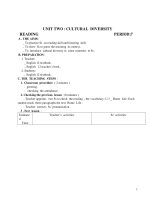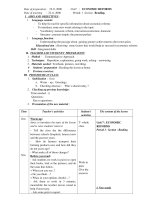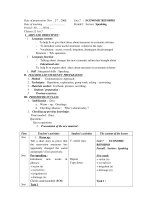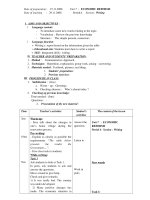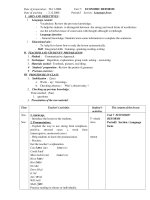Lesson plan 12-Unit 6-Language focus
Bạn đang xem bản rút gọn của tài liệu. Xem và tải ngay bản đầy đủ của tài liệu tại đây (57.06 KB, 3 trang )
Date of preparation : 7.11.2008. Unit6 : FUTURE JOBS
Date of teaching : 12.11.2008 Period:5 Section: Language focus
I AMIS AND OBJECTIVES :
Language content:
- Vocabulary: Review the previous knowledge.
- To help the students to distinguish between and weak forms of some conjunctions and
prepositions
- Revise relative clauses and use reduced relative clauses
- Language function:
- - General knowledge: Students learn some information to complete the sentences
Educational aim :
- To help Ss to know how to study the lesson systematically.
- Skill : Integrated skills : listening- speaking-reading-writing
II. TEACHER AND STUDENTS’ PREPARATION:
1. Method : Communicative Approach.
2. Techniques: Repetition, explanation, group work, asking – answering.
3. Materials needed : Textbook, pictures, real thing.
4 Students’ preparation : Review the points of grammar
5 Previous exercises:
III. PROCEDURE IN CLASS.
1. Stabilization : (2ms)
a. Warm – up : Greetings.
b. Checking absence : Who’s absent today ?
2. Checking up previous knowledge:
Time needed: (5ms)
1. questions
. 3. Presentation of the new material :
Time Teacher’s activities Student’s
acti
vitie
s
The content of the lesson
3ms
5ms
1 Warm up:
- Write some words on the board, and then
pronounce those words aloud.
- Pay attention to its weak/strong forms.
- Ask Ss to read after
I. Pronunciation
- Ask Ss to look at this table.
- Read the words and their weak and strong
form.
- Ask Ss to read after.
- Call some Ss to read seats
Conjunctions Prepositions
Strong
form
Weak
form
Strong
form
Weak
form
And
But
/{νδ/
/βςτ/
/
≅
νδ/
/
≅
ν/
/β≅τ/
At
For
Of
To
/{τ/
/φΟ:ρ/
/Θϖ/
/τυ:/
/φρΘµ/
/≅τ/
/φ≅ρ/
/≅ϖ/
/τΥ/
/τυ/
T- whole
class
repeat
Unit 6 : FUTURE JOBS
Period5: Section : Language
focus
5ms
10ms
13ms
From
/τ≅/
/φρ≅µ/
- Help students how to pronounce those words
correctly by reading first as model
b. Practice: Practise reading these sentences.
- Read the words first: clearly, correctly
- Listen and correct their pronunciation if it’s
needed
- Let students read the sentences and work in
groups
- Listen and remark each group
II. Grammar:
a) Review some grammar structures: Relative
clauses
Whom; who; which; whoever; whose………
- Give some examples
- Ask Ss to make sentences with the structures.
b. Practice:
* Exercise 1: (10m’)
- Introduce the task: Exercise 1. Add who, whoever,
whose, whom or which to complete the following
sentences.
- Guide Ss to do
- Ask Ss to fill each blank with who, whoever,
whose, whom or which.
- Correct mistakes.
Suggested answers:
1. whom 2. which 3. Whoever
4. which 5. Which 6. Who
7. Whose 8. who 9. which 10. whom
* Exercise 2: (10m’)
- Introduce the task: Exercise 2. Join the following
sentences in two ways.
Example:
1. Look at the man. He is teaching in the classroom.
a) Look at the man who is teaching in the
classroom.
b) Look at the man teaching in the classroom.
- Guide Ss to do
- Ask Ss to rewrite the following sentences using
the passive voice.
- Correct mistakes.
1. I read a book that was written by a friend of
mine.
- I read a book written by a friend of mine.
2. A man who was carrying a lot of money in a box
got on the bus.
- A man carrying a lot of money in a box got on the
bus.
3. In the street there were several people who were
repeat
Work in
pairs
Copy down
individually
copy down
I Pronucication
Exercise 1
1. whom 2. which 3. Whoever
4. which 5. Which 6. Who
7. Whose 8. who 9. which 10.
whom
1. I read a book that was written
by a friend of mine.
- I read a book written by a
friend of mine.
2. A man who was carrying a lot
of money in a box got on the bus.
- A man carrying a lot of money
in a box got on the bus.
3. In the street there were
several people who were waiting
for the shop to open.
- In the street there were several
people waiting for the shop to
open.
4. Britain imports many cars
which that were made in Japan.
- Britain imports many cars made
in Japan.
5. There are a lot of people in
your office who want to talk to
you.
- There are a lot of people in
your office wanting to talk to
you.
6. The cowboy who had been
waiting for the shop to open.
- In the street there were several people waiting for
the shop to open.
4. Britain imports many cars which that were made
in Japan.
- Britain imports many cars made in Japan.
5. There are a lot of people in your office who want
to talk to you.
- There are a lot of people in your office wanting to
talk to you.
6. The cowboy who had been wounded by an arrow
fell off his horse.
- The cowboy wounded by an arrow fell off ms
horse.
7. Most of the people who were injured in the crash
recovered quickly.
- Most of the people injured in the crash recovered
quickly.
8. John, who wished he hadn't come to the party,
looked anxiously at his watch.
- John, wishing he hadn't come to the party, looked
anxiously at his watch.
9. The children who were playing football in the
schoolyard were my students.
- The children playing football in the schoolyard
were my students.
10. Vietnam exports a lot of rice which is grown
mainly in the south of the country.
- Vietnam exports a lot of rice grown mainly in the
south of the country.
4 . Consolidation
Confirms the content of the lesson.
Copy down
wounded by an arrow fell off his
horse.
- The cowboy wounded by an
arrow fell off ms horse.
7. Most of the people who were
injured in the crash recovered
quickly.
- Most of the people injured in
the crash recovered quickly.
8. John, who wished he hadn't
come to the party, looked
anxiously at his watch.
- John, wishing he hadn't come to
the party, looked anxiously at his
watch.
9. The children who were
playing football in the schoolyard
were my students.
- The children playing football in
the schoolyard were my students.
10. Vietnam exports a lot of rice
which is grown mainly in the
south of the country.
- Vietnam exports a lot of rice
grown mainly in the south of the
country.
Homework: (2ms) Asks Ss to learn the grammatical points by heart
1 Preparation for the next lesson ()
- Prepare for section : reading the text at home
- Self – evaluation :………………………………………………………………………..
.....................................................................................................................................................
.....................................................................................................................................................
.....................................................................................................................................................

